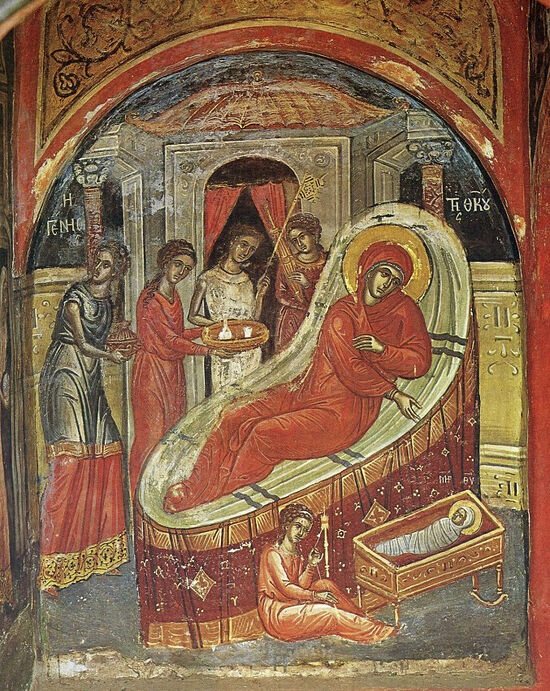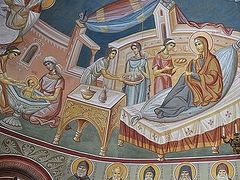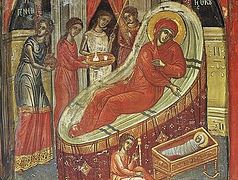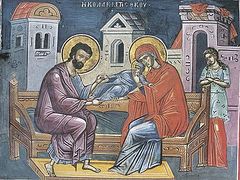“The loosing of Anna’s barrenness hath loosed the world’s want of good things.”1
These words from today’s festive canon mean that the world, barren in spiritual virtues, was “loosed” from this barrenness through the birth of the Theotokos, who loosed the infertility of Sts. Joachim and Anna. As in ancient times, Aaron’s dry rod blossomed forth (Num. 17:8), so now through the “then prefigured, now fulfilled”2 birth of the Most Pure Virgin from the barren Joachim and Anna, the ability of our human nature to bring forth our best flower—Christ, the Savior of the world—has been revealed.
How spiritually barren the world was before the coming of Christ to earth, history clearly testifies. For as it was in the days of Noah, when all flesh had corrupted his way (Gen. 6:12), for which it was doomed to perish in the waters of the flood, so it was in the first coming of the Son of Man (Lk. 17:26ff.), when He Himself appeared on earth in the flesh to save the world which had been spiritually corrupted by carnal lusts (Rom. 1:24-32); and so it will be in the Second Coming of Christ, when due to extreme attraction to earthly goods and passions, that part of humanity that is spiritually barren from unbelief in Christ shall become like the pillar of salt (Lk. 17:31-32). Of course, there were virtues in the pagan world too, but merely human virtues in which, more often than not, deeply rooted passions were concealed under cover of goodness, especially pride, which is alien to true love for man (such as the virtues of the Stoics, for example).
Those peoples who have not believed in Christ, such as the Japanese for example, who have received an image of Christian virtues from the peoples of Europe, remain spiritually barren, bearing no true spiritual fruit in life itself, because while having virtues that appear identical to those of Christian peoples, they remain inwardly foreign to them. They want to appear civilized to the peoples of Europe, and so they try to be like them in their Christian way of life, but only for the sake of vain praise.
However, leaving the pagans, let us turn to those peoples who are called Christians. Are they not also becoming more and more spiritually barren as they lose their faith in Christ? For to what does their waning faith in the possibility of the realization of the Christian virtues testify if not their spiritual barrenness? This decline in the Christian faith among modern peoples was expressed with special force in the teaching of the thinker Nietzsche, who, although he ended his life in madness, said that the Christian virtues: humility, compassion, love, and the others, lead mankind into decline; that mankind need not be more virtuous in order to achieve perfection, but rather more evil. To what does this worship of the power of world-dominating evil, which is the law of natural life until it’s transfigured by the spirit of Christ’s teaching, testify if not to the extreme decline of faith in the power of God, in the all-conquering power of love, the image of which was revealed to us by Christ?
The call of the Church of Christ to love God has ceased to reverberate in the hearts of many today. It seems impossible for them to love God Who is invisible, as their faith in God as a living Being, unseen and wondrously and unceasingly active in the world, is weakening ever more and more. They only want to talk about acts of love for others, whom they do see, considering themselves capable of doing good works for them by their own strength, without resorting to God’s help.
But is it not obvious that love for one’s own kind has greatly diminished in people who have grown weaker in faith in Christ than the Christians of the first centuries, of whom the author of the book of the Acts of the Apostles notes: And the multitude of them that believed were of one heart and of one soul: neither said any of them that ought of the things which he possessed was his own; but they had all things common (Acts 4:32)? Do not modern people of little faith have more proud words about the ever-advancing spiritual growth of mankind than similar deeds of love, according to the word of Scripture: God resisteth the proud, and giveth grace to the humble (1 Pt. 5:5)? And is it not this spiritual barrenness that is evidenced by the unresponsiveness of modern man to a word of spiritual edification, by the coldness with which they meet even famous teachers of the spiritual life who once carried people away with their words?
It’s not through their virtues that the true image of God, according to which they were created, was to be renewed in men, but through humility unknown to the world, which draws Divine grace to us (Prov. 3:34). Such humility was revealed in the Most Holy Virgin, who was thus called by an angel and truly became full of grace (Lk. 1:28-30). Through her, as “the foreordained tabernacle of our reconciliation to God,”3 according to the hymns of the Church, “the tabernacle of sacred David which had fallen is raised up,” “the dust of all men hath been fashioned into a body for God”4 (Amos 9:11-12, Acts 15:16-17). That is, the most pure Flesh of Christ was formed in the womb of the Most Holy Virgin, and all of mankind formed a single Body of Christ, which is the Church (Eph. 1:22-23). It’s through the humility of the Most Holy Virgin alone, whose origin is likened by the prophet to the growth of a rod out of the severed root of Jesse (Is. 11:1), that is, the family of David, humiliated and deprived of human greatness before the coming of Christ to earth, that mankind cultivated the flowers of its own nature and the “right submissive nations”5 began to bear the fruit of the spiritual life. For humility instilled in her that faith through which she surrendered herself with complete obedience to the designs of God’s providence, which ordered human salvation.
Let us, brethren, be filled with the same humility in our virtues that filled the Most Holy Virgin, that we might like her draw grace to ourselves, and prepare our souls through this humility for the “Cultivator of our thoughts and Planter of our souls,” that He might “show forth the barren earth” of our hearts “as right fruitful;”6 that the pains of our spiritual rebirth, which are so magnified by the collapse of humble faith and the multiplication of spiritual pride in people over the centuries, might become easier. And, as the holy Church call us to sing on the days of this feast: “No longer will women bear children in grief, for Joy hath blossomed forth and Life shall live in the world for all men,”7 may our spiritual rebirth be accomplished so easily and joyfully, now that the spiritual barrenness of the world is loosed by the Nativity of the Theotokos, and from her “hath dawned the Sun of Righteousness, Christ our God!”
Amen.




